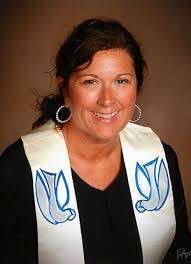The Rev. Kelley Becker: There is room in this community for all of us

This morning, as I write this column, I am listening to the rain and looking out the window at the leaves that have turned bright red and orange in the last few days. The house is quiet, our foster dog is asleep, and the house smells like pumpkin spice. I haven’t turned the television on to watch the news or even read the news. I am delaying opening emails and avoiding social media. It is easy to feel joy in moments like this.
I know, though, that soon I will have to emerge from this delightful break in the action and answer the emails, take in the news, check social media, and probably take the dog outside, even though it is raining. And I acknowledge that at some point in all of that, I will feel the joy slipping away. It will be replaced with all kinds of feelings: frustration that there doesn’t seem to be enough hours in the day, guilt that here I am feeling joyful, and so many beloveds haven’t felt joy in a long time.
I don’t think I am alone. As I’ve talked to people in the church I serve, people in our community, and even family and friends who live elsewhere, there seems to be a lot of us searching for joy. Last Sunday, I talked about that in my sermon. I shared with the congregation what I have read about joy, including one researcher who claims that round and spherical objects, like bubbles and balloons, tend to help us access joy. I like bubbles and balloons as much as the next person, and they do make me smile, but I tend to think joy is deeper than that.
Most of what I have read about joy indicates that is true. In fact, while it may be framed differently from author to author, the idea is the same: To know joy, we need to love and care about each other. It sounds so simple, yet we know it isn’t. Loving and caring are hard work. There are times, in fact, that loving and caring about people is inconvenient or worse, uncomfortable. And so, we decide to do what is easy, what doesn’t force us out of our comfort zone or echo chamber. Sadly, one of the things we sacrifice when we choose that route is joy.
I have seen the following example play out with different details more times than I can count. A neighbor doesn’t like something another neighbor is doing. They don’t like their dog barking, or they don’t like their car parked in the street in front of their house, or the way they keep their yard. Instead of knocking on their neighbor’s door and talking to them, and offering to help, they call the city and report them for a code violation. Or they get on social media and blast them, knowing their neighbor will see it for themselves or someone will tell them about it. I don’t know if this helps you or not, but my rule of thumb is if I am not willing to talk to the person about the problem, then I don’t get to complain to others about it.
More:Rev. Kelley Becker: Public spaces are for all of us
A similar, more troubling example continues to play out in our community. A group of concerned residents has presented the city council with a petition, accusing Oklahomans for Equality-Bartlesville of exposing “their children” to adult entertainment in the form of a drag queen show during the Pride celebration at Unity Square. The petition asks the city council to investigate whether a violation has occurred and, if not, asks the city council to consider changing our community standards for public spaces. A metaphorical knock on the door would have been more appropriate, especially since the people who have been the loudest say they are Christians. Certainly, a more Christ-like response would have been to engage in conversation before ramping up division in our community.
Had these folks had a conversation with OKEQ-Bartlesville leadership, they would have found that what some of them had been told about what happened at the drag show was just not true. Making wild accusations and demanding change without first asking questions and seeking to understand the other point of view are not ways to build community, reflect the ways of God, or cultivate the joy that comes from loving and caring for one another.
More:Rev. Kelley Becker: Don't bring your judgment and try to disguise it as love
I am under no grand illusion that conversations always yield compromise, but they do yield relationships, and respectful, healthy relationships, even when we disagree, make our community stronger. This demonization of one another needs to stop. We are all human beings trying to build lives that reflect our values and priorities. Those values and priorities will not always align with our neighbors, so we must learn to respect one another. Your faith should affect the way you live your life. It should not affect the way other people live their lives. The next time someone does something you don’t like, assess whether you are willing to do the uncomfortable thing and have a conversation with them in which you share your concerns and listen to theirs. If the answer is “No,” then let it go. Let your neighbor be who they were created to be, and you be who you were created to be. There is room in this community for all of us, and we need not constantly be at odds with one another. We are better together.
This article originally appeared on Bartlesville Examiner-Enterprise: Healthy relationships, even when we disagree, strengthen our community
